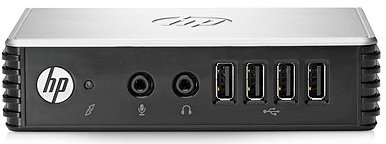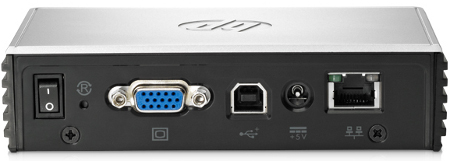Linux multiseat solution advances to Ethernet with HP thin client
Jan 31, 2012 — by Eric Brown — from the LinuxDevices Archive — 249 viewsUserful Corp. announced a new version of its multiseat Linux PC sharing software, now Ethernet-ready and bundled with a $99 HP t200 thin client. The “Userful MultiSeat with HP t200 thin client” solution turns one Edubuntu-based Linux PC into up to 15 computer stations, enabling faster networking than the previous USB-only release, says the company.
The Userful MultiSeat with HP t200 thin client solution is the latest in a series of Userful MultiSeat packages, which combine the company's "Multiplier" PC sharing software with supported USB MultiSeat devices. These have included the previously featured HP t100 thin client, as well as well as low-cost thin clients and related devices from DisplayLink, MCT, and Wyse.
Costing as little as $59 per seat, the technology has been able to turn a single Linux desktop computer into 11 independent computer stations, says the company. Typically, each USB MultiSeat device plugs into USB ports on the host computer, and can support a monitor, keyboard, and mouse. Additional peripherals such as printers can be plugged in via optional USB hubs, says the company.

HP t200 Zero Client

Rear view of HP t200 showing gigabit Ethernet port on right
The HP t200 is essentially a dumb terminal device equipped with a gigabit Ethernet port, four USB host ports, and a fifth USB port for connecting to the host PC. In addition, the 5.35 x 3.58 x 1.38-inch (13.6 x 9.1 x 3.5cm) device includes VGA and audio connections, according to HP. Unless purchased through Userful, the t200 requires an HP MultiSeat ms6200 Desktop PC equipped with Windows MultiPoint Server 2011.
Userful now claims it has sold more than 800,000 MultiSeat virtual desktops in over 100 countries. Advantages compared to traditional Windows PC deployments are said to include lower desktop computing costs, improved manageability, and reduced electricity consumption and e-waste.
Stated Tim Griffin, President of Userful, "The HP t200's support of both Ethernet and USB provides the flexibility to position stations far away from the host computer, or operate without a LAN, making it a very compelling solution for many use cases."
Availability
The Userful MultiSeat with HP t200 thin client solution is now available for evaluation purposes with support for up to 15 seats. Every ministry of education worldwide is said to be eligible for a free 90 day pilot. Commercial sales are said to begin in the second quarter.
More information may be found at the Userful Multiseat product page, although at publication time this page had yet to be updated with the new HP t200 support. More information on the t200 thin client may be found at HP's HP t200 page.
Eric Brown can be reached at [email protected].
This article was originally published on LinuxDevices.com and has been donated to the open source community by QuinStreet Inc. Please visit LinuxToday.com for up-to-date news and articles about Linux and open source.